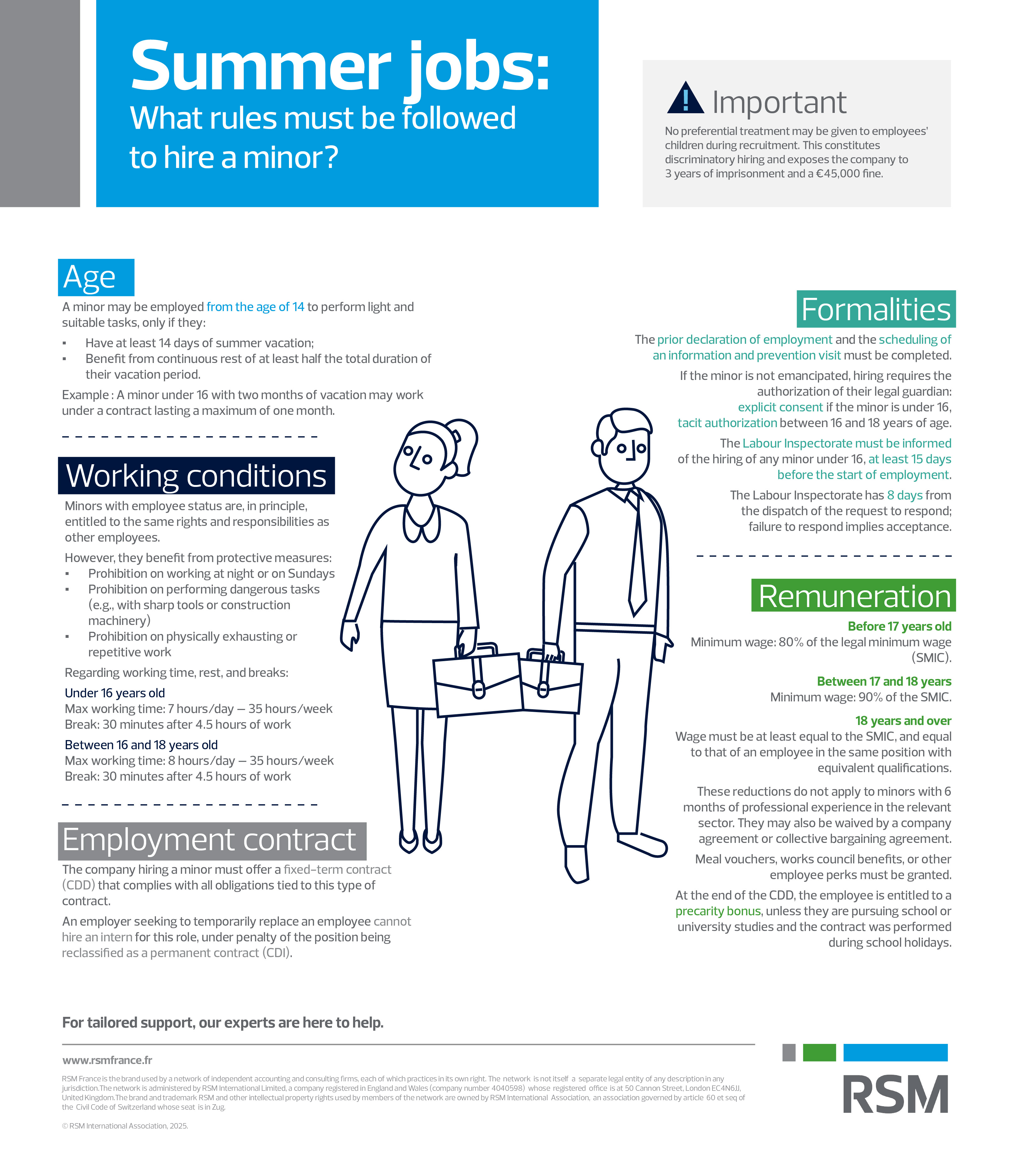Key takeaways
During the summer, many companies need to reinforce their workforce due to employees taking paid leave or to meet seasonal work demands. To do this, they may hire students on school or university holidays as part of “summer jobs.”
However, hiring a minor over the summer requires compliance with a number of legal rules.
Discover our infographic at the end of the article
Summer jobs: what is the legal framework?
Summer jobs & minors: the legal age
A minor can be hired from the age of 14 to perform light duties appropriate to their age during school or university holidays.
However, if the minor is under the age of 16, employment is only possible if they have:
- At least 14 days of summer vacation;
- And a continuous rest period equal to at least half the total duration of their vacation period.
Example: A minor under 16 with two months of summer vacation may enter into an employment contract with a maximum duration of one month.
Can summer jobs be reserved for employees' children?
The Labour Code provides that no one may be excluded from a recruitment process or from access to an internship on the grounds of family situation.
Accordingly, job offers that are exclusively reserved for employees’ children constitute direct discrimination based on family status.
An employer may not, for a summer job or any other position, favour the hiring of employees’ children.
Note: An employer found guilty of discrimination in recruitment may face up to 3 years in prison and a fine of €45,000.
Summer job: what are the administrative requirements?
What are the formalities ?
The usual hiring formalities, such as the mandatory prior declaration of employment or arranging an information and medical awareness visit, must be observed. If the minor is under 18, this medical visit must take place before the start of their probationary period.
Additionally, if the minor is not emancipated, their employment also requires the explicit consent of their legal representative (parent or guardian).
This consent must be given in writing if the minor is under 16. For those aged 16 to 18, written consent is not required—approval may be implied if the contract is executed with the knowledge of the legal representative.
Finally, if the minor is under 16, the employer must send a request for authorisation to the labour inspector at least 15 days prior to the start of employment. This request must include:
- The full name, age, and address of the minor;
- The duration of the contract;
- The nature and conditions of the proposed work;
- Working hours;
- The amount of remuneration.
Important: This request must be accompanied by the written agreement of the minor’s legal representative.
The labour inspector has a period of 8 full days from the date of sending the request to respond. Failure to reply is considered tacit approval.
What type of contract?
The company hiring a minor must have them sign a fixed-term contract (CDD) and comply with all the legal obligations associated with this contract type. The contract must specify, among other things, the exact reason for hiring (seasonal work, employee replacement, etc.), the job title, the length of the trial period, and the end date or minimum duration of the contract.
Note: An employer looking to replace an employee cannot hire a trainee for the task. Doing so risks reclassification of the internship as a permanent employment contract (CDI).
Summer jobs : what are the working conditions and remuneration ?
How are summer jobs paid?
Minors aged 18 and over must receive pay that is at least equal to the minimum wage (SMIC) or the applicable collective minimum wage. They are also entitled to the same remuneration as a permanent employee with equivalent qualifications and duties.
Minors under 18 are paid at least the minimum wage but with a potential reduction:
- 20% below SMIC for those under 17;
- 10% below SMIC for those aged 17 to 18.
Note: These reductions do not apply to minors who have at least 6 months of professional experience in the sector. Moreover, collective agreements may remove these reductions entirely.
They are also entitled to benefits such as meal vouchers and access to works council perks.
Important: At the end of a fixed-term contract, employees are typically entitled to a “precarity bonus” of 10% of their total gross salary, regardless of the contract's duration. However, if the minor is still in school or university, the employer is not required to pay this bonus as long as the contract was carried out during academic holidays.
What working conditions must be respected?
Minors hired for summer jobs have employee status and thus generally have the same rights and obligations as other staff members (e.g. compliance with internal rules, entitlement to collective agreement provisions).
However, minors benefit from additional legal protection.
Unless specifically authorised, they may not work at night or on Sundays. In addition, certain tasks are prohibited due to their hazardous nature, such as using sharp tools or construction equipment (e.g. jackhammers).
It is also prohibited to assign minors under 16 to work that causes excessive fatigue, including repetitive tasks or those carried out in arduous conditions.
Their working time must not exceed:
- 8 hours per day (7 hours for those under 16);
- 35 hours per week, unless an exemption is granted by the labour inspector.
As for daily rest periods:
- At least 14 consecutive hours for minors under 16;
- Generally 12 hours for those aged 16 to under 18.
Minors must also benefit from at least two consecutive days of weekly rest.
Finally, they are entitled to a minimum break of 30 consecutive minutes if their daily working time exceeds 4.5 hours (for comparison, adults are entitled to a 20-minute break when working 6 hours or more).
Hiring a minor for a summer job can be a great opportunity for both the business and the young employee. However, such hiring requires strict compliance with the legal framework, especially regarding age, formalities, working conditions, and remuneration.
Professional guidance ensures full compliance and helps avoid any legal risks. Our experts are available to support you in hiring a minor for a summer job within your organisation.
Our team of HR consulting and support experts is here to listen to you, to understand your strategy, your challenges and your business environment. We offer a multi-disciplinary, agile and customised service.
Find out more about our HR, Social & Payroll Consulting services.





